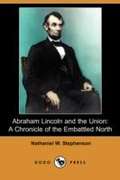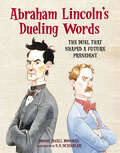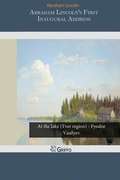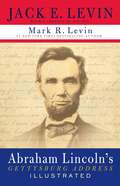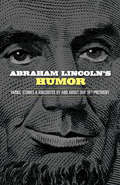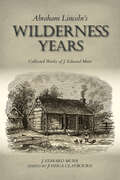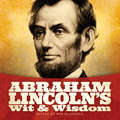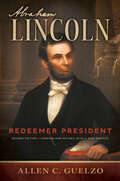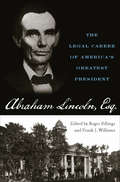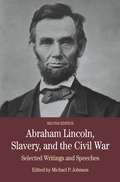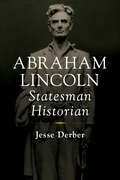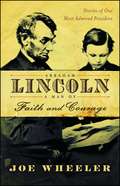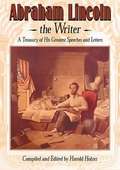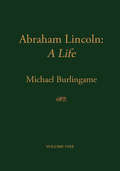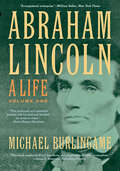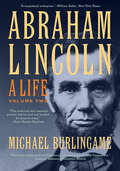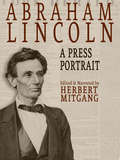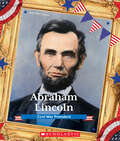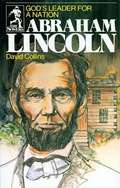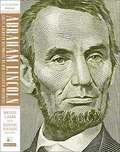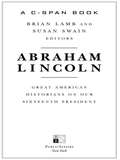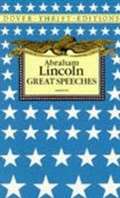- Table View
- List View
Abraham Lincoln for Kids: His Life and Times with 21 Activities
by Janis HerbertProviding a fresh perspective on one of the most beloved presidents of all time, this illuminating activity book tells the rich story of Abraham Lincoln's life and details the events of his era. Highlighting Lincoln's warm, generous spirit and impressive intellect, the guide teaches children about his fascinating life story, his struggles at the onset of the Civil War, and his relevance in today's world. Activities include delivering a speech, holding a debate, drawing political cartoons, and making a stovepipe hat or miniature Mississippi River flatboat. Lively sidebars, abundant photographs and illustrations, and fun projects help to kick the dust off old Honest Abe. Also included are selections from some of Lincoln's most famous speeches and documents, as well as a resource section of Web sites to explore and sites to visit, making this a comprehensive Lincoln biography for young readers.
Abraham Lincoln's Dueling Words: The Duel that Shaped a Future President
by Donna Janell BowmanAbraham Lincoln was known for his sense of humor. But early in his adult life, it got him into trouble. He had to use his imagination to save his career—and maybe even his life. When Abraham Lincoln became frustrated with the actions of James Shield, a political rival, he came up with a plan. It was silly. It was clever. And it was a great big mistake! Lincoln wrote a series of fictional letters to the editor, complaining about Shields. But when Shields took offense, he challenged Lincoln to a duel. How did our future president straighten things out and save the lives and careers of both himself and his rival?Donna Bowman's humorous voice and S. D. Schindler's expressive illustrations are the perfect match for this story of Abraham Lincoln's humor and wit. Back matter includes an author's note and bibliography.
Abraham Lincoln's First Inaugural Address
by Abraham LincolnIt must have been a tense day as the newly elected President Lincoln stood to declare his first inaugural address. As Lincoln looked over the crowed in what was southern Washington D.C. he must have seen the tension, palpable and thick in the air. The controversy over this Northern elected president sparked the civil war, the very thing he tried to prevent in his address. "[. . . ] That there are persons in one section or another who seek to destroy the Union at all events, and are glad of any pretext to do it, I will neither affirm nor deny; but if there be such, I need address no word to them. To those, however, who really love the Union may I not speak? Before entering upon so grave a matter as the destruction of our national fabric, with all its benefits, its memories, and its hopes, would it not be wise to ascertain precisely why we do it? Will you hazard so desperate a step while there is any possibility that any portion of the ills you fly from have no real existence? Will you, while the certain ills you fly to are greater than all the real ones you fly from-will you risk the commission of so fearful a mistake? All profess to be content in the Union if all Constitutional rights can be maintained. Is it true, then, that any right, plainly written in the Constitution, has been denied? I think not. Happily the human mind is so constituted that no party can reach to the audacity of doing this. Think, if you can, of a single instance in which a plainly written provision of the Constitution has ever been denied. If by the mere force of numbers a majority should deprive a minority of any clearly written Constitutional right, it might, in a moral point of view, justify revolution-certainly would if such a right were a vital one. But such is not our[. . . ]".
Abraham Lincoln's Gettysburg Address Illustrated
by Mark R. Levin Jack E Levin"Fourscore and seven years ago our fathers brought forth on this continent a new nation, conceived in liberty and dedicated to the proposition that all men are created equal." Long before his conservative manifesto Liberty and Tyranny became a #1 New York Times bestseller, Mark R. Levin's love for his country was instilled in him by his father, Jack E. Levin. At family dinners, Jack would share his bountiful knowledge of American history and, especially, the inspiration of Abraham Lincoln. The son of immigrants, Jack Levin is an American patriot who responded with deep personal emotion to Lincoln's call for liberty and equality. His admiration for the great Civil War president inspired him to personally design and produce a beautiful volume, enhanced with period illustrations and striking battlefield images by Matthew Brady and other renowned photographers of the era, that brings to life the words of Lincoln's awe-inspiring response to one of the Civil War's costliest conflicts. Now Jack Levin's loving homage to the spirit of American freedom is available in an essential edition that features his original foreword as well as a touching new preface by his son, Mark Levin. In this way, Abraham Lincoln's Gettysburg Address Illustrated celebrates the passing of patriotic pride and historical insight from generation to generation, from father to son. *** The day following the dedication of the National Soldier's Cemetery at Gettysburg, Edward Everett, who spoke before Lincoln, sent him a note saying: "Permit me to express my great admiration for the thoughts expressed by you, with such eloquent simplicity and appropriateness, at the consecration of the cemetery. I should be glad, if I could flatter myself that I came as near to the central idea of the occasion, in two hours, as you did in two minutes." Lincoln wrote back to Everett: "In our respective parts yesterday, you could not have been excused to make a short address, nor I a long one. I am pleased to know that in your judgement the little I did say was not entirely a failure."
Abraham Lincoln's Gettysburg Address Illustrated
by Mark R. Levin Jack E. Levin"Fourscore and seven years ago our fathers brought forth on this continent a new nation, conceived in liberty and dedicated to the proposition that all men are created equal." Long before his conservative manifesto Liberty and Tyranny became a #1 New York Times bestseller, Mark R. Levin's love for his country was instilled in him by his father, Jack E. Levin. At family dinners, Jack would share his bountiful knowledge of American history and, especially, the inspiration of Abraham Lincoln. The son of immigrants, Jack Levin is an American patriot who responded with deep personal emotion to Lincoln's call for liberty and equality. His admiration for the great Civil War president inspired him to personally design and produce a beautiful volume, enhanced with period illustrations and striking battlefield images by Matthew Brady and other renowned photographers of the era, that brings to life the words of Lincoln's awe-inspiring response to one of the Civil War's costliest conflicts. Now Jack Levin's loving homage to the spirit of American freedom is available in an essential edition that features his original foreword as well as a touching new preface by his son, Mark Levin. In this way, Abraham Lincoln's Gettysburg Address Illustrated celebrates the passing of patriotic pride and historical insight from generation to generation, from father to son. *** The day following the dedication of the National Soldier's Cemetery at Gettysburg, Edward Everett, who spoke before Lincoln, sent him a note saying: "Permit me to express my great admiration for the thoughts expressed by you, with such eloquent simplicity and appropriateness, at the consecration of the cemetery. I should be glad, if I could flatter myself that I came as near to the central idea of the occasion, in two hours, as you did in two minutes." Lincoln wrote back to Everett: "In our respective parts yesterday, you could not have been excused to make a short address, nor I a long one. I am pleased to know that in your judgement the little I did say was not entirely a failure."
Abraham Lincoln's Humor: Yarns, Stories, and Anecdotes by and about Our 16th President
by John GraftonToday we think of Abraham Lincoln as America's greatest President. He's celebrated for his leadership and his numerous moving speeches, and for helping the nation through the dark time of the Civil War and out of slavery. Not as widely known was Lincoln's talent for humor and storytelling, and this collection shares many of his jokes and parables. Lincoln used homespun whimsy effectively as a traveling lawyer and later as a tool that helped him negotiate policy, gain influence, and teach subtle moral lessons. The joke was often on him: once when being accused of being two-faced, he responded: "If I had two faces, why would I be wearing this one?" Even longtime rival Stephen Douglas recognized the power of Lincoln's message and presentation, conceding that "When he begins to tell a story, I'm overmatched." To truly understand Lincoln, we must appreciate his witty style of communicating.
Abraham Lincoln's Wilderness Years: Collected Works of J. Edward Murr
by J. Edward MurrAbraham Lincoln spent a quarter of his life—from 1816 to 1830, ages 7 to 21—learning and growing in southwestern Indiana. Despite the importance of these formative years, Lincoln rarely discussed this period, and with his sudden, untimely death in 1865, mysterious gaps appear in recorded history. In Abraham Lincoln's Wilderness Years, Joshua Claybourn collects and annotates the most significant scholarship from J. Edward Murr, one of the only writers to cover this lost period of Lincoln's life. A Hoosier minister who grew up with the 16th president's cousins, Murr interviewed locals who knew Lincoln. Part I features selected portions of Murr's book-length manuscript on Lincoln's youth, published here for the first time. Part II offers a series by Murr on Lincoln's life in Indiana, originally printed in the Indiana Magazine of History. Part III reveals letters between Murr and US Senator Albert J. Beveridge, a prominent historian, about Beveridge's early manuscript of the biography Abraham Lincoln, 1809–1858. Of all Lincoln's biographers, none knew his boyhood associates and Indiana environment as well as Murr, whose complete Lincoln research and scholarship have never been published—until now. Abraham Lincoln's Wilderness Years preserves and celebrates this important source material, unique for studying Lincoln's boyhood years in Indiana.
Abraham Lincoln's Wit and Wisdom
by Bob Blaisdell"My politics are short and sweet, like the old woman's dance." The most eloquent of American presidents, Lincoln had a sagacious or humorous comment on everything that mattered. This attractively designed and illustrated gift book features the Great Emancipator's thoughts and opinions on subjects from politics to human nature to the burdens and privileges of the presidency.
Abraham Lincoln, 2nd Edition: Redeemer President (Library of Religious Biography (LRB))
by Allen C. GuelzoThe story of Abraham Lincoln&’s faith and intellectual life—updated and revised with a new preface—from the three-time winner of the Lincoln Prize and best-selling Civil War–era historian Allen Guelzo. Allen Guelzo&’s peerless account of America&’s most celebrated president explores the role of ideas in Lincoln&’s life, treating him as a serious thinker deeply involved in the nineteenth-century debates over politics, religion, and culture. Through masterful and original scholarly work, Guelzo relates the outward events of Lincoln&’s life to his inner spiritual struggles and sets them both against the intellectual backdrop of his age. The sixteenth president emerges as a creative yet profoundly paradoxical man—possessed of deep moral and religious character yet without adherence to organized religion.Since its original publication in 1999, Abraham Lincoln: Redeemer President has garnered numerous accolades, not least the prestigious Lincoln Prize. After writing several other acclaimed studies of Lincoln and other aspects of Civil War–era history, Guelzo returns to update this important early work for a second edition. A new preface addresses the developments in Lincoln scholarship in the years since the book&’s original publication and offers Guelzo&’s fascinating retrospective look at the unusual path he took to becoming a Lincoln scholar.
Abraham Lincoln, Esq.: The Legal Career of America's Greatest President
by Roger Billings and Frank J. WilliamsLincoln scholars explore the president&’s law career in this informative volume, examining his legal writings on matters from ethics to the Constitution. As our nation's most beloved and recognizable president, Abraham Lincoln is best known for the Emancipation Proclamation and for guiding our country through the Civil War. But before he took the oath of office, Lincoln practiced law for nearly twenty-five years in the Illinois courts. In Abraham Lincoln, Esq., notable historiansexamine Lincoln's law practice and the effect it had on his presidency and the country. This volume offers new perspectives on Lincoln&’s work in Illinois as well as his time in Washington. Each chapter offers an expansive look at Lincoln's legal mind and covers diverse topics such as Lincoln's legal writing, ethics, Constitutional law, and international law. Abraham Lincoln, Esq. emphasizes this overlooked period in Lincoln's career and sheds light on Lincoln's life before he became America&’s sixteenth president.
Abraham Lincoln, Slavery, and the Civil War: Selected Writing And Speeches (Bedford Cultural Editions Series)
by Michael P. JohnsonThis collection, skillfully edited by Michael P. Johnson, offers students the essential Lincoln in a brief and accessible format that makes this a must-assign edition for courses covering the antebellum period, slavery, and the Civil War. <P><P>From famous documents like the Lincoln-Douglas debates and the second inaugural address to crucial memoranda and letters, it reveals the development of Lincoln's views on all the critical issues of the day, including free labor, antebellum politics and the Republican party, slavery, secession, the Civil War, and emancipation. <P><P>Significantly streamlined for the second edition to a more student-friendly length, the volume retains its successful format: documents are organized thematically and chronologically, with editorial headnotes that provide just enough context for students to understand the significance of each selection. <P><P>In addition to Johnson's widely praised biographical introduction, a chronology, maps and pictures, questions for consideration, selected bibliography, and a comprehensive index all enhance students' understanding of this crucial period -- and this crucial figure -- in U.S. history.
Abraham Lincoln, Statesman Historian
by Jesse DerberAbraham Lincoln drew upon history in his political career and particularly when crafting the rhetorical masterpieces that still resonate in the present day. Jesse Derber explores how Lincoln’s views of the limits of human understanding drove a belief in--and untiring pursuit of--historical truth. Lincoln embraced the traditional ideas that good history made good statesmanship and that an understanding of the past informed decision-making in the present. Seeing history as a source of wisdom, Lincoln strove for accuracy through a combination of research, reasoning ability, emotional maturity, and a willingness to admit his mistakes and challenge his biases. His philosophy flowed from an idea that authentic history could enlighten people about human nature. Though he revered precedents, Lincoln understood the past could be imperfect, and that progress through change was an ineffable part of building a better nation. Perceptive and revealing, Abraham Lincoln, Statesman Historian looks at how the Lincoln practiced history and applied its lessons to politics and leadership.
Abraham Lincoln, a Man of Faith and Courage
by Joe WheelerHow Lincoln's Faith Shaped His Leadership Undoubtedly the most revered leader in American history, Abraham Lincoln has had more books written about him than all our nation's presidents put together. But for all that's been written, little has focused on his faith and how this quality shaped the man who led our country during its most tumultuous years. Author Joe Wheeler, historian and scholar, brings to the pages of this insightful book the knowledge gleaned from over ten years of study and more than sixty books on the life and times of Abraham Lincoln. Skillfully weaving his own narrative with direct quotes from Lincoln and poignant excerpts from other Lincoln biographers, Wheeler brings a refreshingly friendly rendition of Lincoln's life, faith, and courage. The stories, historical details, and powerful quotes on the pages of this book will leave a lasting impression on your heart, your mind, and your life.
Abraham Lincoln, the Writer: A Treasury of His Greatest Speeches and Letters
by Abraham Lincoln Harold HolzerA collection of speeches and letters of Abraham Lincoln, with brief introductions that provide historical background.
Abraham Lincoln: A Life
by Michael BurlingameThis award-winning biography has been hailed as the definitive portrait of Lincoln.Named One of the 5 Best Books of 2009 by The AtlanticNamed One of the 10 Top Lincoln Books by Chicago Tribune Winner, 2008 PROSE Award for Best Book in U.S. History and Biography/Autobiography, Association of American PublishersWinner, 2010 Lincoln Prize from the Civil War Institute at Gettysburg CollegeIn the first multi-volume biography of Abraham Lincoln to be published in decades, Lincoln scholar Michael Burlingame offers a fresh look at the life of one of America's greatest presidents. Incorporating the field notes of earlier biographers, along with decades of research in multiple manuscript archives and long-neglected newspapers, this remarkable work will both alter and reinforce our current understanding of America's sixteenth president. Volume 1 covers Lincoln's early childhood, his experiences as a farm boy in Indiana and Illinois, his legal training, and the political ambition that led to a term in Congress in the 1840s. In volume 2, Burlingame examines Lincoln's life during his presidency and the Civil War, narrating in fascinating detail the crisis over Fort Sumter and Lincoln's own battles with relentless office seekers, hostile newspaper editors, and incompetent field commanders. Burlingame also offers new interpretations of Lincoln's private life, discussing his marriage to Mary Todd and the untimely deaths of two sons to disease. In volume 2, Burlingame examines Lincoln's presidency and the trials of the Civil War. He supplies fascinating details on the crisis over Fort Sumter and the relentless office seekers who plagued Lincoln. He introduces readers to the president's battles with hostile newspaper editors and his quarrels with incompetent field commanders. Burlingame also interprets Lincoln's private life, discussing his marriage to Mary Todd, the untimely death of his son Willie to disease in 1862, and his recurrent anguish over the enormous human costs of the war.
Abraham Lincoln: A Life
by Michael BurlingameNow in paperback, this award-winning biography has been hailed as the definitive portrait of Lincoln.Named One of the 10 Top Lincoln Books by Chicago TribuneNamed One of the 5 Best Books of 2009 by The AtlanticWinner, 2008 PROSE Award for Best Book in U.S. History and Biography/Autobiography, Association of American PublishersWinner, 2010 Lincoln Prize from the Civil War Institute at Gettysburg CollegeIn the first multi-volume biography of Abraham Lincoln to be published in decades, Lincoln scholar Michael Burlingame offers a fresh look at the life of one of America’s greatest presidents. Incorporating the field notes of earlier biographers, along with decades of research in multiple manuscript archives and long-neglected newspapers, this remarkable work will both alter and reinforce our current understanding of America’s sixteenth president. Volume 1 covers Lincoln’s early childhood, his experiences as a farm boy in Indiana and Illinois, his legal training, and the political ambition that led to a term in Congress in the 1840s. In volume 2, Burlingame examines Lincoln’s life during his presidency and the Civil War, narrating in fascinating detail the crisis over Fort Sumter and Lincoln’s own battles with relentless office seekers, hostile newspaper editors, and incompetent field commanders. Burlingame also offers new interpretations of Lincoln’s private life, discussing his marriage to Mary Todd and the untimely deaths of two sons to disease. But through it all—his difficult childhood, his contentious political career, a fratricidal war, and tragic personal losses—Lincoln preserved a keen sense of humor and acquired a psychological maturity that proved to be the North’s most valuable asset in winning the Civil War. Published to coincide with the 200th anniversary of Lincoln's birth, this landmark publication establishes Burlingame as the most assiduous Lincoln biographer of recent memory and brings Lincoln alive to modern readers as never before.
Abraham Lincoln: A Life
by Michael BurlingameNow in paperback, this award-winning biography has been hailed as the definitive portrait of Lincoln.In the first multi-volume biography of Abraham Lincoln to be published in decades, Lincoln scholar Michael Burlingame offers a fresh look at the life of one of America’s greatest presidents. Incorporating the field notes of earlier biographers, along with decades of research in multiple manuscript archives and long-neglected newspapers, this remarkable work will both alter and reinforce current understanding of America’s sixteenth president. In volume 2, Burlingame examines Lincoln’s presidency and the trials of the Civil War. He supplies fascinating details on the crisis over Fort Sumter and the relentless office seekers who plagued Lincoln. He introduces readers to the president’s battles with hostile newspaper editors and his quarrels with incompetent field commanders. Burlingame also interprets Lincoln’s private life, discussing his marriage to Mary Todd, the untimely death of his son Willie to disease in 1862, and his recurrent anguish over the enormous human costs of the war.
Abraham Lincoln: A Press Portrait
by Herbert Mitgang"To say he is ugly is nothing. To add that his figure is grotesque is to convey no adequate impression." "He is destined to occupy in history...a quaintness, originality, courage, honesty, magnanimity and popular force of character such as have never heretofore..." These starkly different 19th century newspaper depictions describe one and the same man: Abraham Lincoln. Nearly 150 years after his death, Lincoln is universally considered our most beloved U.S. president. Yet in his own time, the reception he received at the hands of journalists was far more mixed. In this essential volume, noted Lincoln scholar Herbert Mitgang has painstakingly gathered the most thorough, wide-ranging collection of actual newspaper accounts that show how Lincoln was portrayed by northern, southern, and foreign newspapers. It reveals a far more beleaguered, less godlike, and finally a richer Lincoln than has come through many other biographies. While often revered in print, for example, he was just as often crucified, even by some newspapers in his home state of Illinois that portrayed him throughout his career as a joker instead of a thinker. Most shockingly, perhaps, one Houston paper wrote after his assassination: "From now until God's judgment day, the minds of men will not cease to thrill at the killing of Abraham Lincoln." For those only familiar with the "retouched" versions of Lincoln's life, Abraham Lincoln: A Press Portrait offers an often surprising and wholly unsanitized account of how his contemporaries actually saw him before, during, and after the Civil War. It is must read for the serious scholar and Lincoln buff alike.
Abraham Lincoln: Civil War President (Presidential Biographies)
by John PerritanoMeet Abraham Lincoln, our 16th president-and possibly one of the most extraordinary "ordinary" people who ever lived.Lincoln was a self-educated man who rose to the highest office in the land. He held the nation together during the Civil War and pushed for the end of slavery in America. He will always be remembered.This series of engaging, in-depth books introduces readers to the men who have led our country since its very first days. Lively text and colorful illustrations are supplemented by fun facts, a timeline, and even a sampling of the subject's most famous quotes.Presidential Biographies will be the first books kids reach for when writing a report-or if they're simply looking for a fascinating read!
Abraham Lincoln: God's Leader for a Nation
by David CollinsThis biography describes Lincoln's search for an understanding God.
Abraham Lincoln: Great American Historians on Our Sixteenth President
by Brian Lamb Susan SwainIn a handsome, gift-quality volume celebrating the 200th anniversary of Lincoln's birth, America's top Lincoln historians offer their diverse perspectives on the life and legacy of America's sixteenth president. Spanning Lincoln's life--from his early career as a Springfield lawyer, to his presidential reign during one of America's most troubled historical periods, to his assassination in 1865--these essays, developed from original C-SPAN interviews, provide a compelling, composite portrait of Lincoln, one that offers up new stories and fresh insights on a defining leader.Edited by C-SPAN's Brian Lamb and Susan Swain, illustrated with Lamb's photographs of Lincoln landmarks, and promoted throughout the year on C-SPAN, Abraham Lincoln is a wonderful compendium of information and deeply-informed analysis that deserves a prominent place on every bookshelf.
Abraham Lincoln: Great American Historians on Our Sixteenth President
by Brian Lamb Susan Swain C-SpanIn this beautifully designed volume, AmericaOCOs top Lincoln historians offer a diverse array of perspectives on the life and legacy of AmericaOCOs sixteenth president. Spanning LincolnOCOs life?from his early career as a Springfield lawyer, to his presidential reign during one of AmericaOCOs most troubled historical periods, to his assassination in 1865?these essays, developed from original C-SPAN interviews, provide a compelling, composite portrait of Lincoln, one that offers up new stories and fresh insights on a defining leader. Extras include a timeline of LincolnOCOs life, brief biographies of the 56 contributors, and LincolnOCOs most famous speeches. "
Abraham Lincoln: Great Speeches
by Abraham LincolnPresents the full text of a selection of President Lincoln's greatest speeches, with historical notes and context provided by John Grafton.
Abraham Lincoln: Lawyer, Leader, Legend (Dk Readers Level 3 Ser.)
by Justine Fontes Ron FontesNIMAC-sourced textbook
